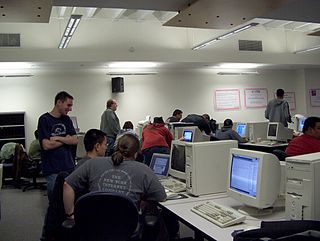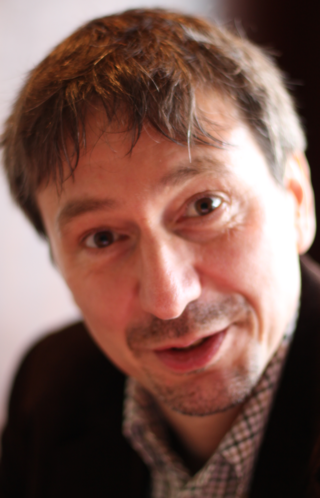
Free software, libre software, or libreware is computer software distributed under terms that allow users to run the software for any purpose as well as to study, change, and distribute it and any adapted versions. Free software is a matter of liberty, not price; all users are legally free to do what they want with their copies of a free software regardless of how much is paid to obtain the program. Computer programs are deemed "free" if they give end-users ultimate control over the software and, subsequently, over their devices.
The free software movement is a social movement with the goal of obtaining and guaranteeing certain freedoms for software users, namely the freedoms to run, study, modify, and share copies of software. Software which meets these requirements, The Four Essential Freedoms of Free Software, is termed free software.
An open standard is a standard that is openly accessible and usable by anyone. It is also a common prerequisite that open standards use an open license that provides for extensibility. Typically, anybody can participate in their development due to their inherently open nature. There is no single definition, and interpretations vary with usage. Examples of open standards include the GSM, 4G, and 5G standards that allow most modern mobile phones to work world-wide.

The Proposal for a Directive of the European Parliament and of the Council on the patentability of computer-implemented inventions, procedure number 2002/0047 (COD) was a proposal for a European Union (EU) directive aiming to harmonise national patent laws and practices concerning the granting of patents for computer-implemented inventions, provided they meet certain criteria. The European Patent Office describes a computer-implemented invention (CII) as "one which involves the use of a computer, computer network or other programmable apparatus, where one or more features are realised wholly or partly by means of a computer program".

Linux Australia is the national, Australian Free and Open Source Software Community organisation. It was founded in 1997 and formally incorporated in New South Wales as a non-profit organisation in 1999. Linux Australia aims to represent Australian Free and Open Source Software communities and to support and collaborate with related groups, including Linux User Groups in Australia.

The Free Software Foundation Europe (FSFE) is an organization that supports free software and all aspects of the free software movement in Europe, with registered chapters in several European countries. It is a registered voluntary association incorporated under German law.
The Foundation for a Free Information Infrastructure (FFII) is a non-profit organisation based in Munich, Germany, dedicated to establishing a free market in information technology, by the removal of barriers to competition. The FFII played a key organisational role and was very active in the campaign which resulted in the rejection of the EU software patent directive in July 2005.
Hartmut Pilch is a German software developer, translator, and digital rights activist who founded the Foundation for a Free Information Infrastructure (FFII). Since 2015 Pilch supported the local Pegida movement in Munich and spoke at several Pegida rallies.

LinuxTag was an annual Free and Open Source Software (FOSS) conference and exposition with an emphasis on Linux but also BSD descendants located in Germany. The name is a compound with the German Tag meaning "Day", as it was initially a single day conference, but soon extended to multiple days, then always including a weekend. LinuxTag was the world's largest FLOSS conference and exhibition for years and aimed to provide a comprehensive overview of the Linux and Free Software market as well to promote contacts between users and developers. With this broad approach LinuxTag was one of the most important events of this kind.

Free and open-source software (FOSS) is a term used to refer to groups of software consisting of both free software and open-source software, where anyone is freely licensed to use, copy, study, and change the software in any way, and the source code is publicly available so that people are encouraged to improve the design of the software. This is in contrast to proprietary software, where the software is under restrictive copyright or licensing and the source code is hidden from the users.
Open Invention Network (OIN) is a company that acquires patents and licenses them royalty-free to its community members who, in turn, agree not to assert their own patents against Linux and Linux-related systems and applications.
SHARE Inc. is a volunteer-run user group for IBM mainframe computers that was founded in 1955 by Los Angeles-area users of the IBM 704 computer system. It evolved into a forum for exchanging technical information about programming languages, operating systems, database systems, and user experiences for enterprise users of small, medium, and large-scale IBM computers such as IBM S/360, IBM S/370, zSeries, pSeries, and xSeries. Despite the capitalization of all letters in the name, the official website says "SHARE is not an acronym; it's what we do."

In the 1950s and 1960s, computer operating software and compilers were delivered as a part of hardware purchases without separate fees. At the time, source code, the human-readable form of software, was generally distributed with the software providing the ability to fix bugs or add new functions. Universities were early adopters of computing technology. Many of the modifications developed by universities were openly shared, in keeping with the academic principles of sharing knowledge, and organizations sprung up to facilitate sharing. As large-scale operating systems matured, fewer organizations allowed modifications to the operating software, and eventually such operating systems were closed to modification. However, utilities and other added-function applications are still shared and new organizations have been formed to promote the sharing of software.
Opposition to software patents is widespread in the free software community. In response, various mechanisms have been tried to defuse the perceived problem.

A Linux User Group or Linux Users' Group (LUG) or GNU/Linux User Group (GLUG) is a private, generally non-profit or not-for-profit organization that provides support and/or education for Linux users, particularly for inexperienced users. The term commonly refers to local groups that meet in person but is also used to refer to online support groups that may have members spread over a very wide area and that do not organize, or are not dependent on, physical meetings. Many LUGs encompass FreeBSD and other free-software / open source Unix-based operating systems.

The Open Source Business Alliance - Bundesverband für digitale Souveränität e.V. is a German non-profit that operates Europe's biggest network of companies and organizations developing, building and using open source software.

Erik Hjalmar Josefsson is a Swedish musician, campaigner against software patents, and internet activist.
The use of free software instead of proprietary software can give institutions better control over information technology. A growing number of public institutions have started a transition to free-software solutions. This grants independence and can also address the often-argued need for public access to publicly funded developments. This is the only way that public services can ensure that citizen data is handled in a trustworthy manner since non-free software doesn't allow total control over the employed functions of the needed programs.
Open source is source code that is made freely available for possible modification and redistribution. Products include permission to use the source code, design documents, or content of the product. The open-source model is a decentralized software development model that encourages open collaboration. A main principle of open-source software development is peer production, with products such as source code, blueprints, and documentation freely available to the public. The open-source movement in software began as a response to the limitations of proprietary code. The model is used for projects such as in open-source appropriate technology, and open-source drug discovery.